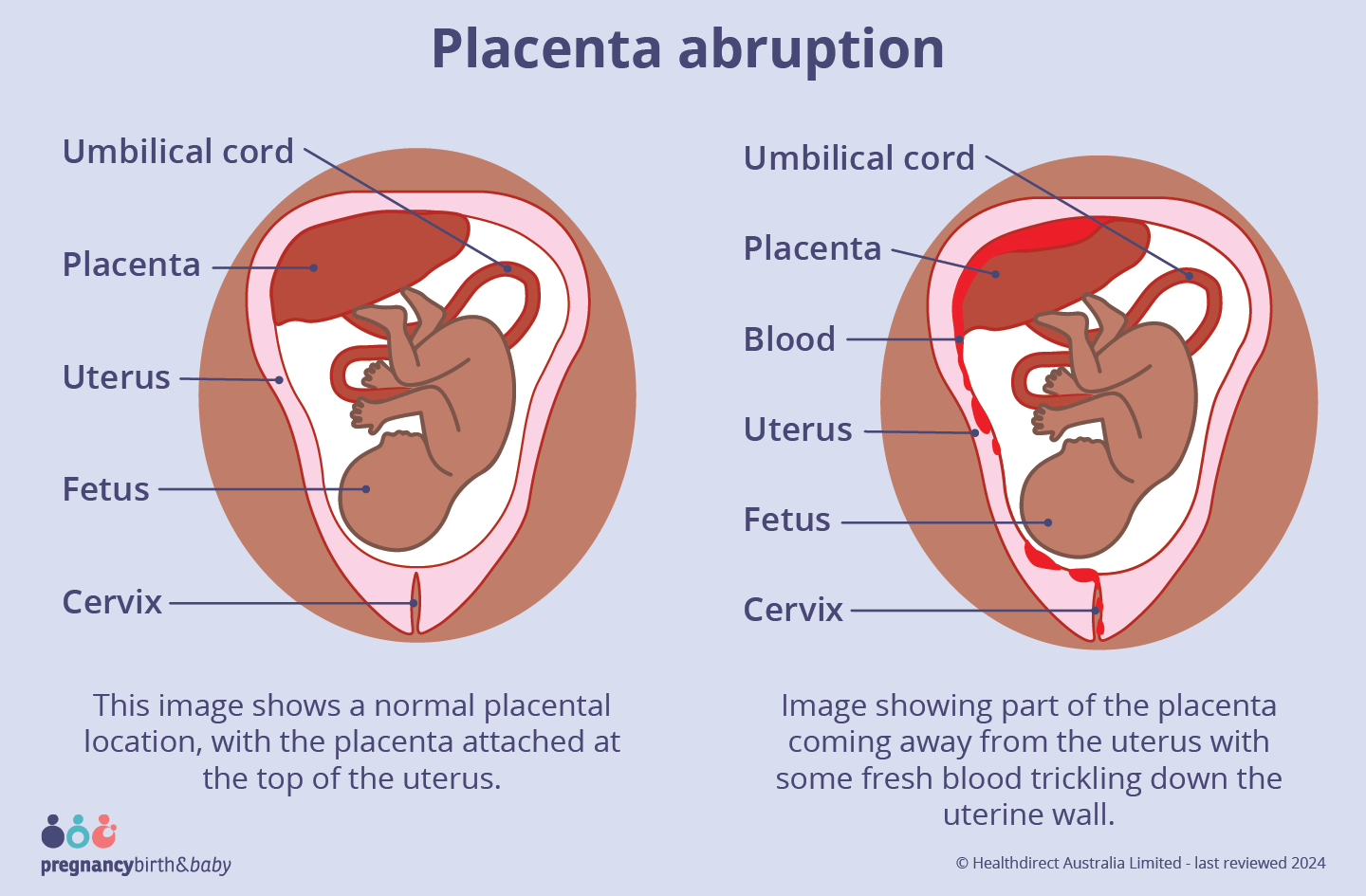Placental abruption
6-minute read
If you have bleeding from your vagina during your pregnancy, contact your midwife or doctor immediately. If the bleeding and pain are bad, call an ambulance on triple zero (000). Or go to your nearest hospital emergency department.
What is placental abruption?
Placental abruption happens when some or all of the placenta comes away from the wall of the uterus (womb) during pregnancy.
It is a medical emergency and often happens very suddenly.
Placental abruption can cause pain and heavy bleeding. It can deprive your baby of oxygen and nutrients. This can result in serious complications for mum and baby, including death.

What are the symptoms of placental abruption?
Placental abruption can cause bleeding during the second half of pregnancy. The amount of bleeding varies from person to person.
The bleeding doesn’t necessarily show how bad the abruption is. Sometimes the blood is trapped behind the placenta and does not come out of your vagina.
The other main symptom is bad abdominal (tummy) pain. It tends to be a constant pain, rather than coming in waves like contractions. Some women may have no bleeding, but sudden, bad abdominal pain.
Placental abruption is a serious condition.
If you experience bleeding during your pregnancy, contact your midwife or doctor immediately. If the bleeding and pain are bad, call an ambulance on triple zero (000). Or go to your nearest hospital emergency department.
What are the risks to you and your baby?
Placental abruption is rare but serious. In some cases it can be life threatening. It can also be dangerous for your baby as they may not get all the oxygen they need. This increases the risk of premature birth and stillbirth.
When does placental abruption happen?
Placental abruption can happen from 20 weeks into pregnancy. However, almost half happen after 37 weeks of pregnancy.
In Australia, placental abruption affects about 1 in every 100 to 200 pregnancies.
What are the risk factors for placental abruption?
The causes of placental abruption aren’t always known.
Serious injury to the abdomen, such as a fall or car accident is thought to be one cause.
Some factors that may increase your chance of having a placental abruption include:
- having previously had a placental abruption
- your waters breaking before your baby is due
- you are having twins or a multiple pregnancy
- you are a smoker or use drugs
- you have high blood pressure or pre-eclampsia
- you have an infection in your uterus
- you are over 35 years old
How is placental abruption treated?
If your placenta comes away from the uterus, this is an emergency and you will need to go to hospital. Your baby may not get enough oxygen. You may also have bleeding inside your uterus. In either case, you and your baby will be watched closely.
Depending on the severity, this might involve:
- examining your tummy
- an internal examination of your vagina and cervix
- monitoring your baby’s heart rate with a cardiotocograph (CTG)
- an ultrasound
- blood tests
- bed rest
A CTG will be done to make sure your baby is not distressed.
An ultrasound will let your doctor check the placenta.
Blood tests will check your iron levels and blood group. This is just in case you need a blood transfusion.
In more serious cases, your baby may need to be delivered quickly. This is usually done by caesarean.
In severe cases you may need a blood transfusion and/or hysterectomy (removal of your uterus).
What to do if you think there may be a problem
If you have any vaginal bleeding during your pregnancy, it’s important to see your doctor or midwife as soon as possible.
If the bleeding and pain are bad, call an ambulance on triple zero (000). Or go to your nearest hospital emergency department.
It’s important to attend your routine antenatal appointments throughout pregnancy. Often complications can be identified during these appointments.
Where can I get more information about placental abruption?
Speak with your medical team so they can help you and your family through your recovery.
You can also get help and information from:
- The Australian Birth Trauma Association offers advice, resources, and a peer support service.
- The Centre of Perinatal Excellence (COPE) gives information and a list of support services.
- Perinatal Anxiety & Depression Australia (PANDA) — call 1300 726 306 to speak with a counsellor. They are available Monday to Friday from 9am to 7.30pm Australian Eastern Time.

Speak to a maternal child health nurse
Call Pregnancy, Birth and Baby to speak to a maternal child health nurse on 1800 882 436 or video call. Available 7am to midnight (AET), 7 days a week.
Learn more here about the development and quality assurance of healthdirect content.
Last reviewed: July 2022



